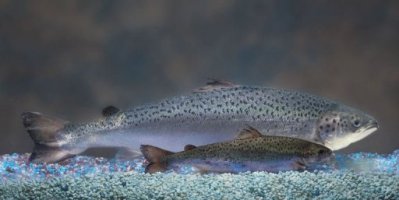US considers approval of genetically engineered salmon

US authorities have begun to consider approval for the first time the sale of genetically engineered salmon, a move that some say could open the door to more transgenic animals on American dinner tables.
A US Food and Drug Administration panel has set a hearing for September 19-20 to consider a proposal by Massachusetts-based AquaBounty Technologies for production and sale of a new Atlantic salmon with a growth hormone gene from the Chinook salmon that allows it to grow faster.
The company said the genetic change allows the fish to grow to market size in half the time of conventional salmon but that in all other respects, its AquAdvantage salmon "are identical to other Atlantic salmon."
A size comparison of an AquAdvantage® Salmon (background) versus a non-transgenic Atlantic salmon sibling (foreground) of the same age.
The new strain of salmon can help meet rising demand for fish and reduce pressure on wild fish stocks, the firm contends.
It says it can avoid the pollution, disease and other problems associated with saltwater fish farms by raising the salmon at inland facilities.
"The benefit of this technology is that because the fish grows more efficiently it can be grown faster and closer to population centres," says Ron Stotish, chief executive of the group.
"I think this technology can be a tremendous aid to assuring a safe and sustainable food supply," he adds.
But environmental and food safety groups are raising fierce objections, saying this could not only endanger wild salmon but open the door to other kinds of genetically modified animal foods that may pose health or environmental dangers.
If approved, the salmon would be the first transgenic animal allowed for US human consumption, although officials have approved a goat with genetic modifications to produce an anti-clotting treatment.











